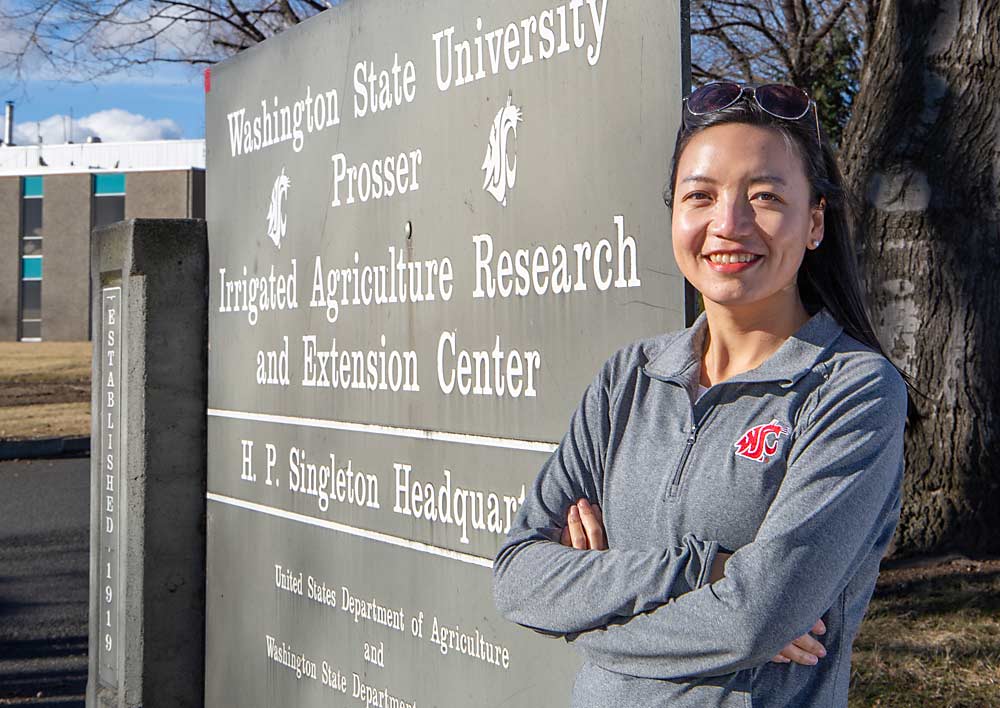
The right internship can change the arc of a student’s career.
For one Chinese biotechnology student, a summer internship with the weed science program at Washington State University’s Irrigated Agriculture Research and Extension Center in Prosser did just that, introducing Rui Liu to the idea that, compared to biotech research, “applied science can help farmers faster,” she said.
Now, a decade later, Liu is back in Prosser as WSU’s new specialty crop weed scientist, filling the position that’s been empty since her mentor that summer, Rick Boydston, retired in 2018.
“When I saw this position open, I was so excited,” Liu said. “My focus will be on specialty crops in the Columbia Basin.”
She joined WSU this winter, after working as an assistant scientist in Kansas in wheat, soybean, sorghum and corn systems. Liu earned her doctorate from Texas A&M University, studying herbicide resistance in weedy rice, the most challenging weed species in rice systems both in Texas and back home in China.
She earned her undergraduate and master’s degrees at Nanjing Agricultural University, deploying biotechnology to study weedy rice.
“In China, it’s all small farms, small growers, and their livelihoods depend on their farms. It was hard to see so many weeds growing in their fields. After that project, I developed an interest in how science can help people,” Liu said.
While working toward her master’s degree, she spent a summer in Prosser with Boydston, going on a lot of field visits to get an introduction to the wide variety of crop systems — and their weed challenges — in the Columbia Basin.
What she discovered: “I like to be outside and working with farmers instead of being in the lab all day long.”
Now, Liu is making similar rounds, trying to get to know industry leaders and learn about the most pressing weed research needs.
“We have two other weed scientists who take care of the row crops, so everything else will be under my umbrella — grapes, tree fruit, mint, alfalfa, potatoes, onions and other vegetables,” she said. “I’ve been attending a lot of meetings and meeting people.”
Her background is in integrated weed management and dealing with herbicide-resistant weeds.
In Washington, there aren’t many reports of resistant weed species, Liu said, but there also hasn’t been anyone looking for that in the past few years.
“Resistance happens because people come to rely on the same herbicides,” she said. “So far, in the vegetables and tree fruit, not a lot of resistance has been reported compared to row crops, but we need to protect the available herbicides so those technologies can last for a long time.”
Take Roundup, for example. When it first hit the market, people began using it for everything because it was so effective, but now, resistance is being reported in many different weed species and crop systems, she said.
While there are few reports of resistance in Washington, there are plenty of other weed challenges awaiting her. With so many specialty crops in the region, she hopes to focus on weed species common to multiple crops, as well as tackle commodity-specific challenges.
Cherry growers trying to manage X disease have learned that common orchard weeds can harbor the pathogen and attract the leafhoppers that transmit it. Entomologists and pathologists are leading several research projects examining the role that weeds and weed management can play in disease transmission, and how it can be interrupted.
“I’m really excited to talk with her about the project we have on vector management for X disease,” said Tobin Northfield, a WSU entomologist and chair of the industry’s response task force. “I’m hoping to collaborate and looking forward to hearing her ideas.”
The wine grape industry is also eager to work with her, said Melissa Hansen, director of research for the Washington State Wine Commission.
“We look forward to connecting with her and educating her about the weed issues facing the Washington wine industry, and getting her plugged in to the research needs,” she said.
—by Kate Prengaman






Leave A Comment